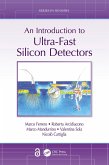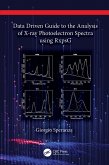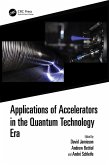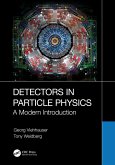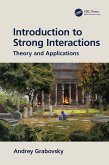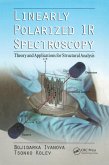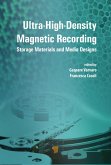Marco Ferrero, Roberta Arcidiacono, Marco Mandurrino, Valentina Sola, Nicolò Cartiglia
An Introduction to Ultra-Fast Silicon Detectors (eBook, PDF)
Design, Tests, and Performances
0,00 €
0,00 €
inkl. MwSt.
Sofort per Download lieferbar

0 °P sammeln
0,00 €
Als Download kaufen

0,00 €
inkl. MwSt.
Sofort per Download lieferbar

0 °P sammeln
Jetzt verschenken
Alle Infos zum eBook verschenken
0,00 €
inkl. MwSt.
Sofort per Download lieferbar
Alle Infos zum eBook verschenken

0 °P sammeln
Marco Ferrero, Roberta Arcidiacono, Marco Mandurrino, Valentina Sola, Nicolò Cartiglia
An Introduction to Ultra-Fast Silicon Detectors (eBook, PDF)
Design, Tests, and Performances
- Format: PDF
- Merkliste
- Auf die Merkliste
- Bewerten Bewerten
- Teilen
- Produkt teilen
- Produkterinnerung
- Produkterinnerung

Bitte loggen Sie sich zunächst in Ihr Kundenkonto ein oder registrieren Sie sich bei
bücher.de, um das eBook-Abo tolino select nutzen zu können.
Hier können Sie sich einloggen
Hier können Sie sich einloggen
Sie sind bereits eingeloggt. Klicken Sie auf 2. tolino select Abo, um fortzufahren.

Bitte loggen Sie sich zunächst in Ihr Kundenkonto ein oder registrieren Sie sich bei bücher.de, um das eBook-Abo tolino select nutzen zu können.
This book describes the development of innovative silicon sensors known as ultra-fast silicon detectors for use in the space-time tracking of charge particles.
- Geräte: PC
- ohne Kopierschutz
- eBook Hilfe
- Größe: 89.11MB
Andere Kunden interessierten sich auch für
![An Introduction to Ultra-Fast Silicon Detectors (eBook, ePUB) An Introduction to Ultra-Fast Silicon Detectors (eBook, ePUB)]() Marco FerreroAn Introduction to Ultra-Fast Silicon Detectors (eBook, ePUB)0,00 €
Marco FerreroAn Introduction to Ultra-Fast Silicon Detectors (eBook, ePUB)0,00 €![Data Driven Guide to the Analysis of X-ray Photoelectron Spectra using RxpsG (eBook, PDF) Data Driven Guide to the Analysis of X-ray Photoelectron Spectra using RxpsG (eBook, PDF)]() Giorgio SperanzaData Driven Guide to the Analysis of X-ray Photoelectron Spectra using RxpsG (eBook, PDF)52,95 €
Giorgio SperanzaData Driven Guide to the Analysis of X-ray Photoelectron Spectra using RxpsG (eBook, PDF)52,95 €![Applications of Accelerators in the Quantum Technology Era (eBook, PDF) Applications of Accelerators in the Quantum Technology Era (eBook, PDF)]() Applications of Accelerators in the Quantum Technology Era (eBook, PDF)52,95 €
Applications of Accelerators in the Quantum Technology Era (eBook, PDF)52,95 €![Detectors in Particle Physics (eBook, PDF) Detectors in Particle Physics (eBook, PDF)]() Georg ViehhauserDetectors in Particle Physics (eBook, PDF)0,00 €
Georg ViehhauserDetectors in Particle Physics (eBook, PDF)0,00 €![Introduction to Strong Interactions (eBook, PDF) Introduction to Strong Interactions (eBook, PDF)]() Andrey GrabovskyIntroduction to Strong Interactions (eBook, PDF)48,95 €
Andrey GrabovskyIntroduction to Strong Interactions (eBook, PDF)48,95 €![Linearly Polarized IR Spectroscopy (eBook, PDF) Linearly Polarized IR Spectroscopy (eBook, PDF)]() Bojidarka IvanovaLinearly Polarized IR Spectroscopy (eBook, PDF)74,95 €
Bojidarka IvanovaLinearly Polarized IR Spectroscopy (eBook, PDF)74,95 €![Ultra-High-Density Magnetic Recording (eBook, PDF) Ultra-High-Density Magnetic Recording (eBook, PDF)]() Ultra-High-Density Magnetic Recording (eBook, PDF)112,95 €
Ultra-High-Density Magnetic Recording (eBook, PDF)112,95 €-
-
-
This book describes the development of innovative silicon sensors known as ultra-fast silicon detectors for use in the space-time tracking of charge particles.
Dieser Download kann aus rechtlichen Gründen nur mit Rechnungsadresse in A, B, BG, CY, CZ, D, DK, EW, E, FIN, F, GR, HR, H, IRL, I, LT, L, LR, M, NL, PL, P, R, S, SLO, SK ausgeliefert werden.
Produktdetails
- Produktdetails
- Verlag: Taylor & Francis eBooks
- Seitenzahl: 196
- Erscheinungstermin: 7. Juli 2021
- Englisch
- ISBN-13: 9781000415094
- Artikelnr.: 62108783
- Verlag: Taylor & Francis eBooks
- Seitenzahl: 196
- Erscheinungstermin: 7. Juli 2021
- Englisch
- ISBN-13: 9781000415094
- Artikelnr.: 62108783
- Herstellerkennzeichnung Die Herstellerinformationen sind derzeit nicht verfügbar.
Nicolò Cartiglia is Senior Research Scientist at the Istituto Nazionale di Fisica Nucleare, Italy, and a Visiting Research Scientist, University of California, USA. He has been working at the forefront of experimental high-energy physics since his PhD degree; specifically, focused on detector design, construction and commissioning. He has been member of several large collaborations, based both in Europe and US. He is the principal investigator of several prestigious grants such as a joint US-Italy bilateral grant, an ERC-advanced, and an Italian PRIN.
Marco Mandurrino is a Postdoctoral Researcher at the Istituto Nazionale di Fisica Nucleare (INFN) in Turin, Italy. He joined INFN after his PhD in Electronic Devices as a specialist in silicon particle detector design and modeling. Member of national and international collaborations involved in the R&D of radiation detectors for high-energy physics experiments, from 2018 to 2020 he headed the RSD project, which focused on the development of silicon trackers. He is also lecturer of courses and seminars on numerical simulation of silicon detectors at the Turin University.
Marco Ferrero is a Postdoctoral Researcher at the Università del Piemonte Orientale in Novara, Italy. Member of national and international collaborations involved in the radiation hard semiconductor devices design for high energy physics experiments since 2014. He has been working on ultra-fast silicon detector technology since 2014, which has been the topic of his PhD degree; He is also lecturer of seminars on ultra-fast silicon detectors.
Valentina Sola is a Postdoctoral Researcher at the Istituto Nazionale di Fisica Nucleare, Italy. She is an experimental physicist working in the field of high-energy particle physics. She has worked at the HERA ep collider at DESY, and she is a member of the CMS Collaboration at the Large Hadron Collider. She is involved in the R&D of innovative silicon sensors and the design and construction of the MIP Timing Detector for the CMS Experiment. She is the principal investigator of an INFN project for young researchers to design and develop silicon sensors for extreme fluences.
Roberta Arcidiacono is Professor at the Università del Piemonte Orientale, Italy, working as an experimental physicist in the field of high-energy particle physics. Member of international collaborations such as NA48, NA62 and CMS (CERN), her work focuses on the design and commissioning of detectors for high energy physics experiments. From 2014 she works on novel silicon sensors development, supported by an ERC-advanced and an Italian grant.
Marco Mandurrino is a Postdoctoral Researcher at the Istituto Nazionale di Fisica Nucleare (INFN) in Turin, Italy. He joined INFN after his PhD in Electronic Devices as a specialist in silicon particle detector design and modeling. Member of national and international collaborations involved in the R&D of radiation detectors for high-energy physics experiments, from 2018 to 2020 he headed the RSD project, which focused on the development of silicon trackers. He is also lecturer of courses and seminars on numerical simulation of silicon detectors at the Turin University.
Marco Ferrero is a Postdoctoral Researcher at the Università del Piemonte Orientale in Novara, Italy. Member of national and international collaborations involved in the radiation hard semiconductor devices design for high energy physics experiments since 2014. He has been working on ultra-fast silicon detector technology since 2014, which has been the topic of his PhD degree; He is also lecturer of seminars on ultra-fast silicon detectors.
Valentina Sola is a Postdoctoral Researcher at the Istituto Nazionale di Fisica Nucleare, Italy. She is an experimental physicist working in the field of high-energy particle physics. She has worked at the HERA ep collider at DESY, and she is a member of the CMS Collaboration at the Large Hadron Collider. She is involved in the R&D of innovative silicon sensors and the design and construction of the MIP Timing Detector for the CMS Experiment. She is the principal investigator of an INFN project for young researchers to design and develop silicon sensors for extreme fluences.
Roberta Arcidiacono is Professor at the Università del Piemonte Orientale, Italy, working as an experimental physicist in the field of high-energy particle physics. Member of international collaborations such as NA48, NA62 and CMS (CERN), her work focuses on the design and commissioning of detectors for high energy physics experiments. From 2014 she works on novel silicon sensors development, supported by an ERC-advanced and an Italian grant.
1. Operating Principles of a Silicon Sensors. 2. Ultra Fast Silicon
Detectors. 3. Numerical Modeling and Simulation. 4. Experimental
Techniques. 5. Characterization of UFSDs. 6. Characterization of Irradiated
UFSDs. 7. Sensors for Extreme Fluences
Detectors. 3. Numerical Modeling and Simulation. 4. Experimental
Techniques. 5. Characterization of UFSDs. 6. Characterization of Irradiated
UFSDs. 7. Sensors for Extreme Fluences
1. Operating Principles of a Silicon Sensors. 2. Ultra Fast Silicon
Detectors. 3. Numerical Modeling and Simulation. 4. Experimental
Techniques. 5. Characterization of UFSDs. 6. Characterization of Irradiated
UFSDs. 7. Sensors for Extreme Fluences
Detectors. 3. Numerical Modeling and Simulation. 4. Experimental
Techniques. 5. Characterization of UFSDs. 6. Characterization of Irradiated
UFSDs. 7. Sensors for Extreme Fluences

